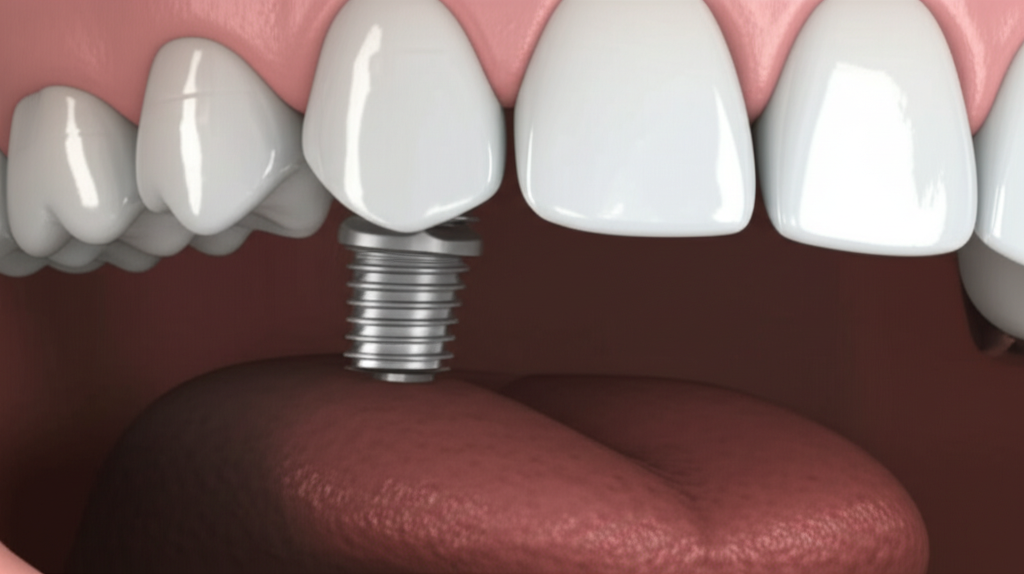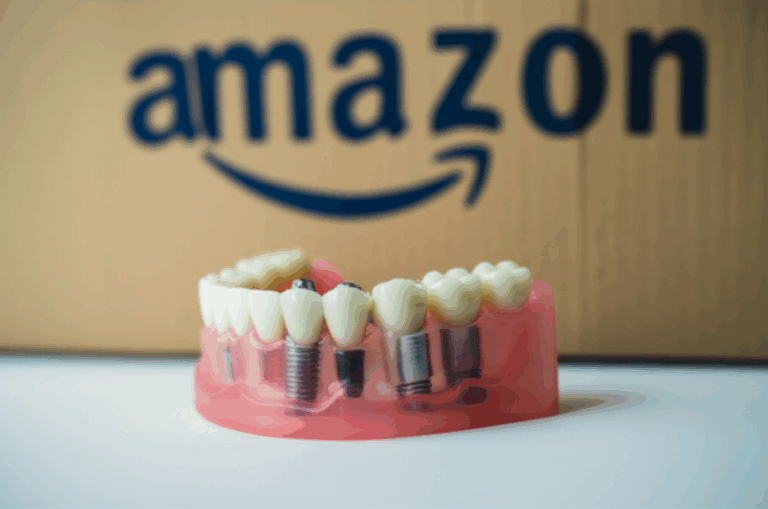
Do Dental Implants Fall Out? Understanding Risks, Causes, and Prevention
Have you found yourself worrying, “Can my dental implant fall out?” Maybe you’re thinking about getting implants and want to make sure you’re making a good choice for your health. Or maybe you already have an implant and wonder how long it will last. If any of these questions fit you, take a deep breath. You’re not alone—and you’re in the right place.
Dental implants are known for being strong, steady, and long-lasting—but just like anything, they’re not completely free from problems. Sometimes, things don’t work out as planned. That’s why it’s important to know how implants really work, what could go wrong, and—most important—what you can do to keep your smile safe for years to come.
In This Article
- The Truth About Dental Implant Stability
- How Dental Implants Work: The Foundation of Their Strength
- Yes, Dental Implants Can Fail – But It’s Not Common
- Top Causes: Why a Dental Implant Might Fail or “Fall Out”
- Warning Signs: How to Notice a Possible Failing Implant
- What to Do If Your Dental Implant Feels Loose or Falls Out
- Preventing Dental Implant Failure: Making Them Last Longer
- Dental Implant Success Rates and How Long They Last: The Good News
- Your Healthy Takeaway: What to Do Next
The Truth About Dental Implant Stability
Let’s get right to it—can dental implants fall out? Technically, yes. But before you think of your new tooth suddenly popping out like a loose button, know this: real implant “fall out” is very rare. Most times when people say an implant is ‘falling out’ it’s usually the crown (the tooth you see) or a screw getting loose—not the actual implant post inside your jaw.
The good news: Dental implants are made to last for decades, and with today’s technology and skilled dentists, success rates are around 95–98% over ten years or more. For most people, dental implants are a safe and steady fix that can last even longer than bridges, dentures, or some natural teeth!
Still, like a great car or your favorite pair of shoes, dental implants need care and attention. Knowing what could go wrong, catching problems early, and staying on top of care are the best ways to keep your implant healthy.
How Dental Implants Work: The Foundation of Their Strength
If you’re not sure how dental implants work, let’s make it simple.
A dental implant acts like the root of a real tooth. It’s a small screw, usually made of titanium or zirconia, that’s put into your jawbone by a dentist. On top of the implant is a connector called an abutment, which holds the crown, bridge, or denture.
So what keeps it from falling out? The key is a process called osseointegration. Imagine your jawbone growing tightly around the implant. In a few months, your bone sticks to and surrounds the implant, locking it in place.
Key parts of a dental implant:
- Implant post: The part that goes into your bone.
- Abutment: The “connector” that joins the implant to your new tooth.
- Crown/Bridge/Denture: The fake tooth (or teeth) that’s attached to the abutment.
Why is this so steady?
Picture osseointegration like cement hardening around the metal rods in a building’s base. The connection gets so strong that implants can handle years of biting, chewing, and daily use—if everything heals correctly.
Yes, Dental Implants Can Fail – But It’s Not Common
Now, let’s clear up a big myth: Most dental implants do NOT fail. When you ask, “do dental implants fall out?” you really mean—is the risk big that the implant post itself comes loose or must be removed?
Here’s what’s true:
- It’s much more common for the crown (the tooth you see) to get loose or fall off than for the implant to fail.
- Real implant “fall out” only happens in around 2–5% of cases in the first year, and less often after it has healed.
- Once an implant heals and joins to your bone, and you keep your mouth clean, it should stay put for many years—often decades.
So, what’s the difference between a loose crown and a failed implant?
- If just your crown or abutment feels wobbly, but the area under your gums feels rock solid, you probably only need a quick fix.
- If the implant itself is moving (even a little), that’s a sign the bone around it isn’t holding it tight.
Let’s go over the main reasons a dental implant might actually fail—and what you can do about it.
Top Causes: Why a Dental Implant Might Fail or “Fall Out”
Like any setup with different parts, dental implants can face a few troubles. Here’s what might cause it, when, and why.
Early Implant Failure: Before Full Healing
This happens in the first weeks or months after surgery.
Main reasons:
- Failed Osseointegration: The bone doesn’t grip the implant tight enough. This can happen if:
- The bone isn’t healthy enough.
- You put too much pressure on the implant before it’s ready.
- Early infection near the surgery area.
- Healing is not good (sometimes because of diabetes or some medicines).
- Surgical Problems: Even expert dentists need to be careful. Putting the implant in at the wrong angle or into weak bone can lead to trouble.
Late Implant Failure: Once the Implant Is Restored
This happens months or even years after being placed.
Possible causes:
- Peri-Implantitis: This is like gum disease but around an implant. Infection and swelling attack the gum and bone. If not fixed soon, you can lose bone and the implant will loosen.
- Risk factors: Smoking, not cleaning your teeth well, uncontrolled diabetes, history of gum disease.
- Injury or Ongoing Force: Getting hit in the mouth, grinding teeth at night, or a mouth injury can mess up the bone-implant connection—even years later.
- Health Problems/Medicines: Some drugs (like bisphosphonates or long-term steroids), or medical conditions like bad diabetes or immune system troubles can stop bone from healing well.
- Mechanical Problems: Sometimes, the implant or connecting screw can actually break after years of hard biting. Usually, though, it’s the crown or abutment that comes loose.
Other Reasons
- Bad Placement: Not enough bone, not enough space, or being too close to nerves or sinuses can cause issues.
- Bone Graft Problems: If you needed a bone graft first, the implant is a tiny bit more likely to have problems—but not by much.
A Quick Comparison
Think of your dental implant like a fence post in your yard. If you dig a deep hole, use good cement, and let it set before hanging anything heavy, your fence will last a long time—even with wind and rain. But if the hole is too shallow, the dirt is weak, or you hang a gate too early, it might start to lean or wobble quickly.
Warning Signs: How to Notice a Possible Failing Implant
How can you tell if your dental implant is in trouble? The faster you notice, the easier it is to fix. Look for these warning signs:
- Ongoing pain, throbbing, or soreness around the implant—especially if it’s getting worse.
- Swelling, red gums, or pus near the implant (could be an infection).
- Feeling the implant move or wiggle. It should never move at all.
- Trouble chewing or pain when you bite down.
- Gums pulling away from the implant. If you see more of the metal post, see your dentist.
- Bad taste or smell near the implant.
Don’t ignore warning signs, even if they get better sometimes. Treat these signs like your car’s check-engine light—the sooner you check it out, the less likely it becomes a big, expensive problem.
What to Do If Your Dental Implant Feels Loose or Falls Out
So what if you notice your implant, or the piece attached to it, feels loose—or, worse, something is in your mouth that shouldn’t be?
- Loose crown/abutment: Most of the time it can just be fixed or replaced without messing with the implant post.
- Loose implant: Your dentist will check with X-rays and a quick look. Sometimes cleaning and medicines can help. Other times, the implant might need to come out and be replaced later.
Can a lost implant be put back in? Sometimes yes, sometimes no. It depends on why it fell out and if your bone is healthy. Your dentist might ask you to heal, maybe get a bone graft, and then try again later.
Preventing Dental Implant Failure: Making Them Last Longer
Back to the good news: most implant issues can be stopped before they start. Here’s what you can do:
1. Choose a Skilled and Experienced Dental Implant Provider
- Pick a dentist, oral surgeon, or periodontist who really knows implants.
- Ask about their training and how many implants they have done.
- Implants done right from the start have a much better chance of lasting.
2. Follow After-Surgery Instructions
- The healing time after your implant is put in is super important.
- Don’t put pressure on the implant, stick to soft foods, and keep it clean.
- Don’t smoke—smoking can double or triple your risk of failure.
3. Keep Your Mouth Really Clean
- Brush two times a day with a soft toothbrush and gentle toothpaste.
- Floss or use tiny brushes between your teeth and around the implant.
- Special tools, like water flossers, can help reach tough spots.
4. Get Regular Check-ups and Professional Cleanings
- Visit your dentist every 3–6 months for check-ups and cleanings.
- Catching problems early is the best way to avoid bigger troubles.
5. Take Care of Any Health Problems
- If you have diabetes, keep your blood sugar under control.
- Always tell your dentist about any new health issues or medicines.
6. Protect Your Implants
- If you grind your teeth at night, ask about a nightguard.
- Play sports? Wear a mouthguard to stop injuries.
7. Avoid Bad Habits
- Don’t chew ice, hard candy, or use your teeth to open things.
- Don’t ignore small problems—fix them before they get worse.
Need Special Restorations?
Good quality crowns and bridges matter, too. Dental labs like the crown and bridge lab and implant dental lab can make sure your restoration fits well and lasts a long time. Ask your dentist about your lab choices if you want the best options.
Dental Implant Success Rates and How Long They Last: The Good News
Let’s talk facts—because nothing feels better than knowing the real numbers.
Success and Survival Rates:
- About 95–98% of dental implants are still working after 5–10 years.
- At 10–15 years, 90–95% are still strong; many last even longer.
- Some have lasted more than 30 years!
- The crown may need to be replaced in 10–15 years, but the implant itself can stay healthy much longer.
What makes your implant more likely to succeed?
- Good health and clean teeth
- Not smoking
- Good, strong bone
- Great care during surgery
- Regular brushing, flossing, and dental visits
What makes your implant more likely to fail?
- Smoking—failure can be as high as 20% in heavy smokers
- Poorly controlled diabetes or immune system problems
- Not keeping teeth and implants clean
- Bad teeth grinding (without a nightguard)
- Gum disease or early infection around the implant
Real Life Example
Case Study:
A 55-year-old man, heavy smoker with badly controlled diabetes, gets a dental implant. Three years later, he gets peri-implantitis from smoking, high blood sugar, and not cleaning his mouth well. The implant gets loose and needs to be taken out. Lesson: Even great surgery can’t make up for ongoing problems.
Bottom line: Most people who listen to their dentist, care for their mouth, and go to regular check-ups enjoy many years—often decades—of trouble-free use from their dental implants.
Your Healthy Takeaway: What to Do Next
Dental implants are a solid, safe choice. True implant “fall out” is rare, especially if you:
- Pick a skilled dentist for your surgery and crown work.
- Brush and floss every day, and use any cleaning tools your dentist suggests.
- Get regular check-ups and cleanings at your dentist’s office.
- Manage your health, especially diabetes or immune issues.
- Stay away from tobacco, avoid injuries, and don’t bite hard things.
- Get pain, swelling, or looseness checked right away.
Remember: Dental implants take care to stay healthy. But with a little effort, they give you a tooth replacement that works and looks great for years—sometimes even better than a real tooth or a bridge.
If you notice changes—pain, wiggling, swelling—or are worried about your implant, see your dentist soon.
Still thinking about getting an implant? Talk to a dentist who knows implants well, so they can answer your questions and set you up for long-term success.
Summary Checklist
- Implant failure is rare—but can happen. You can stop most problems with simple care.
- Warning signs to watch for: pain, looseness, swelling, gums shrinking, bad taste or smell.
- Prevention is key: Clean your mouth daily, get regular check-ups, keep health issues under control, and stay away from tobacco.
- Act fast if something seems off—quick action can save your implant.
- Ask questions before getting an implant—knowing the facts helps you take care of your smile!
Want to learn more about tooth repairs, different dental materials, or new dental technology? Check out dental implant, some usual dental problems, or how digital dental labs are changing dentistry to be even more accurate and helpful.
Your smile is worth it—take care of it with good habits and knowledge, and your dental implants can last a lifetime.








